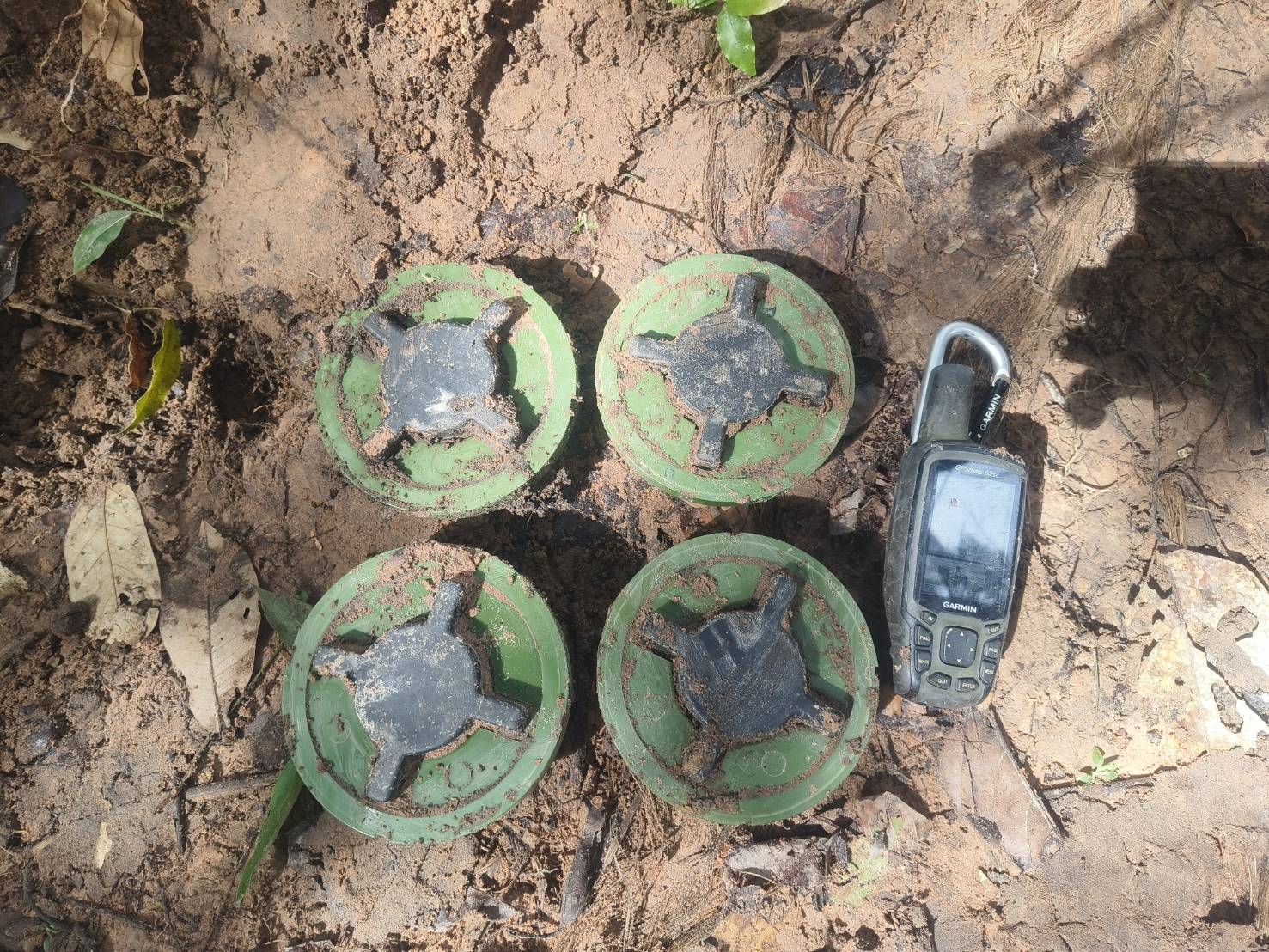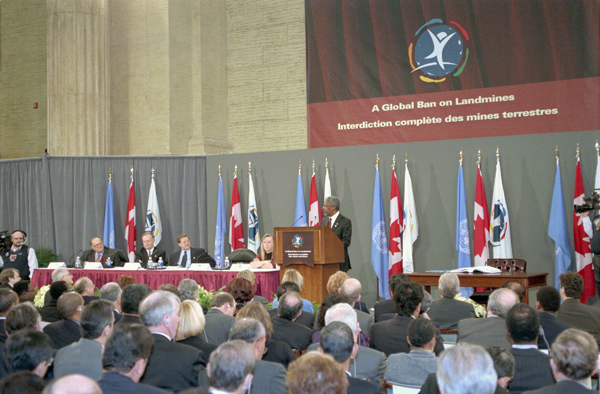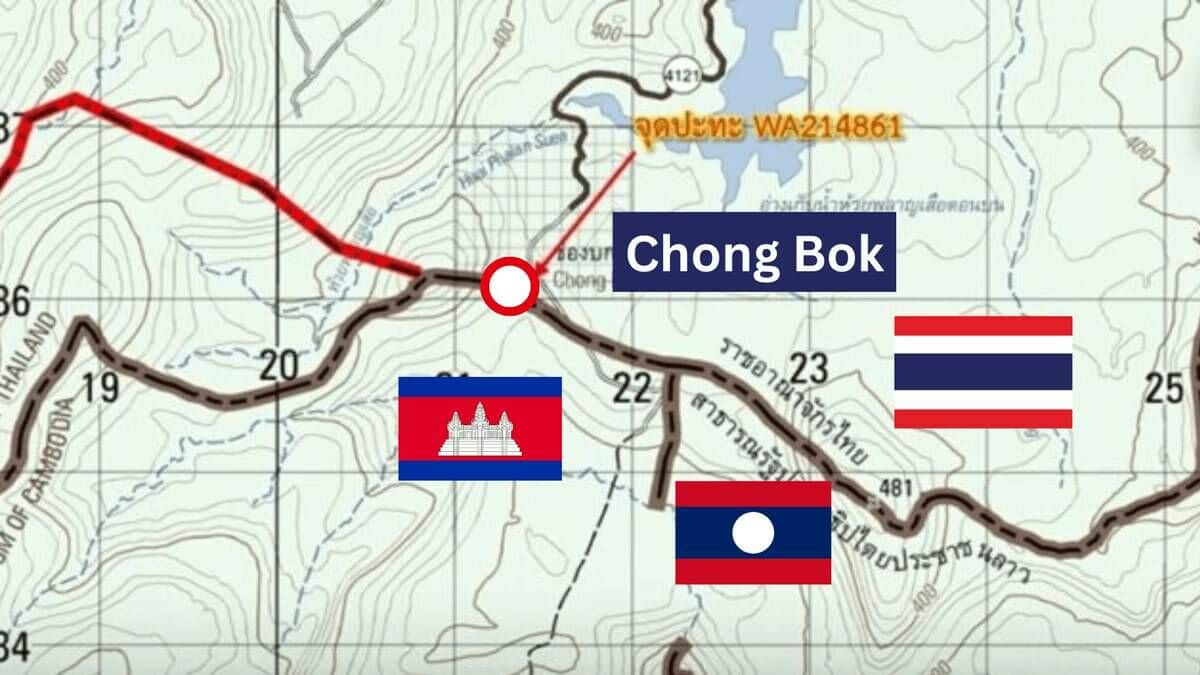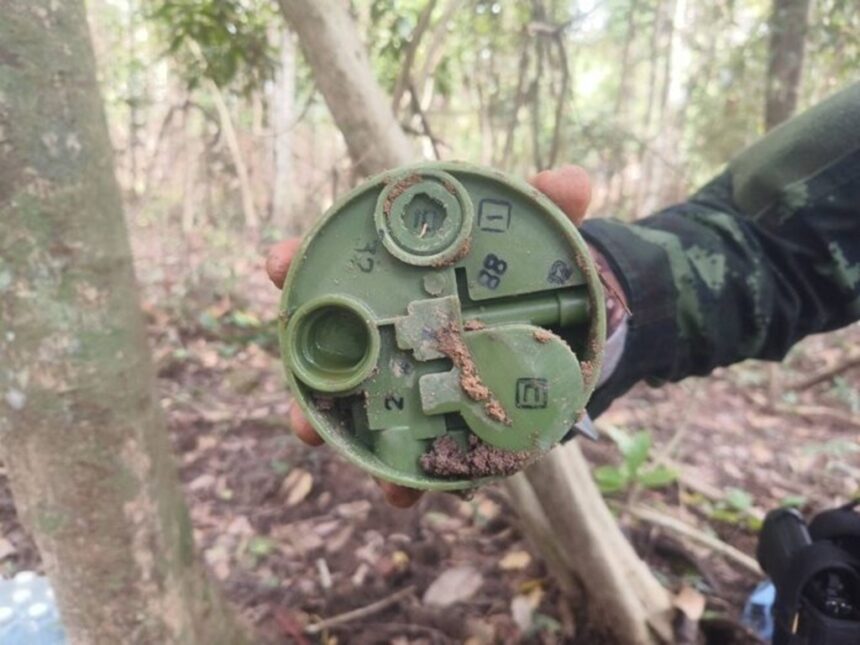UBON RATCHATHANI, Thailand – Tension on the Thai-Cambodian border has surged after a landmine explosion injured three Thai soldiers on 16 July 2025 in the Chong Bok area of Ubon Ratchathani province.
One of the soldiers lost his foot in the blast. Thailand’s army chief, General Pana Klaewplodthuk, shared on Saturday that investigators believe more than 100 landmines, recently planted by Cambodian forces on Thai soil, led to the attack.
According to Thailand, this act breaches the 1997 Ottawa Convention that bans anti-personnel mines. Now, the Thai Ministry of Foreign Affairs is moving forward with a formal complaint to the United Nations, accusing Cambodia of violating this international agreement.
Cambodia denies any wrongdoing, further deepening a long-running border dispute that has made relations even more fragile.

Landmine Blast Reignites Old Tensions
During a scheduled patrol near Hill 481 in the often-disputed Chong Bok area, known as the Emerald Triangle, where Thailand, Cambodia and Laos meet, Private Thanapat Huiwan activated a Russian-made PMN-2 anti-personnel mine.
This blast took his left foot and caused two other soldiers, Sergeant Patiphant Srilasak and Private Nathawut Srikhem, to suffer from chest pains. After the explosion, Thai troops found three more PMN-2 mines nearby, along with clear signs that the ground had been recently disturbed.
Thai sources insist these mines are not part of their stocks, nor leftovers from earlier conflicts like the 1973 Thai-Vietnamese fighting or Cambodia’s civil war.
General Klaewplodthuk said the mines were placed inside Thai territory and described this act as serious. He warned that they might find more than 100 TM-57 and PMN-2 mines buried in the area. Thai army engineers quickly started clearance work.
The army also released video footage, which they claim shows a Cambodian soldier dealing with a TM-57 mine near the border. This footage has added to Thai suspicions.

Legal Challenge Cites Ottawa Convention
Thailand’s response has been quick and determined. The Ministry of Foreign Affairs, represented by spokesman Nikorndej Balankura, is collecting proof for a formal complaint to the United Nations.
Both Thailand (ratified in 1999) and Cambodia (ratified in 1997) joined the Ottawa Convention, which requires countries to stop using anti-personnel mines, destroy their stockpiles within four years, and clear all planted mines over the next decade.
Officials in Bangkok argue that the new landmines break these rules. Lieutenant General Boonsin Padklang, head of the Second Army Region, said, “Nobody would plant mines next to their own troops. Even the Cambodian leader admitted these were inside Thailand.”
Thailand’s Border Special Operations Centre is set to meet on 21 July to prepare the evidence for the UN, with the Foreign Ministry leading diplomatic efforts.
Cambodia strongly denies any involvement in the incident. The Cambodian Mine Action and Victim Assistance Authority (CMAA) called Thailand’s claims “baseless” in a statement on 18 July and restated Cambodia’s commitment to the Ottawa Convention.
The CMAA referred to Cambodia’s history of landmine suffering during its civil war and its active role in global efforts to clear mines, including hosting the 2024 Siem Reap-Angkor mining summit. “Cambodia categorically denies and firmly rejects all allegations suggesting that it has laid new landmines,” said the CMAA.
Heng Ratana, director-general of the Cambodian Mine Action Centre (CMAC), argued that Thailand’s theory of newly planted mines is designed to provoke trouble. He said the matter should go to the International Court of Justice (ICJ) for an impartial ruling and added that social media posts blaming Cambodia have no solid proof. Ratana suggested that Thai soldiers or other groups could be responsible, but did not give evidence.

Historic Disputes at Chong Bok
The Chong Bok region, known as Mom Bei in Cambodia, has been at the centre of border disputes dating back to the colonial era. The Emerald Triangle, where Thailand, Cambodia and Laos meet, has seen trouble since the 19th century when colonial treaties altered the borders.
The region saw bloodshed in 1973 between Thai and Vietnamese troops, who were then chasing Khmer Rouge fighters. Most recently, a gunfight on 28 May 2025 in Chong Bok led to a Cambodian soldier’s death and worsened relations.
The larger Thai-Cambodian border conflict involves several areas, such as the Preah Vihear Temple, which the ICJ awarded to Cambodia in 1962, and contested sites like Ta Moan Thom, Ta Moan Toch, and Ta Kra Bei. In June 2025, Cambodian Prime Minister Hun Manet said his government would seek ICJ decisions on these regions.
This announcement stirred strong feelings in Thailand, especially as the 1962 verdict is still resented by many.
Cambodia’s former Prime Minister and current Senate President, Hun Sen, has played a key part in raising tensions. With a reputation for uncompromising tactics, Hun Sen has regularly accused Thailand of trespassing and warned of military retaliation if Thai soldiers cross into disputed areas.
His tough words, including a threat on 26 June to release private talks with former Thai Prime Minister Thaksin Shinawatra, deepened the rift. After a leaked phone call between Hun Sen and Thai PM Paetongtarn Shinawatra, in which she used a familiar address and criticized a Thai commander, public outrage grew in Thailand. This led to Paetongtarn’s suspension by the Constitutional Court on 1 July.
Hun Sen also called for Cambodians to boycott Thai goods, films and internet services, fuelling nationalist feelings on both sides. His son, Prime Minister Hun Manet, has tried to strike a more open tone, urging peace and stressing the need for proper border talks through the Joint Boundary Commission (JBC). Still, Hun Sen’s sway remains strong, and his approach has made diplomatic progress much harder.
What If Cambodia Is Found Guilty?
Should evidence show that Cambodia breached the Ottawa Convention, the fallout could be significant. The United Nations might issue strong criticism or pass resolutions denouncing Cambodia’s actions.
The Ottawa Convention’s support team could insist on spot checks of Cambodia’s military supplies and closer scrutiny of its mine-clearing work. Cambodia’s international image, built on its anti-mine efforts, could take a serious hit, possibly impacting aid and future investment.
In more serious cases, the UN Security Council could look at targeted sanctions, although China’s alignment with Cambodia makes this less likely.
A clear breach could also push Thailand to pursue legal steps at the ICJ or step up its military presence near the border, risking armed clashes. Trade could also suffer: Cambodia has already banned Thai fruit imports, and Thailand has closed some border crossings, putting pressure on both economies.
The landmine blast has brought the border row between Thailand and Cambodia to a dangerous peak. Thailand’s decision to go to the United Nations marks a move from direct talks to an international approach, while Cambodia is pushing for the ICJ to have its say.
Old grudges, rising nationalism and personal rivalries between leaders like Hun Sen and Thaksin Shinawatra add more obstacles.
China’s offer to mediate, presented by Foreign Minister Wang Yi at an ASEAN summit, could provide a chance for honest talks, as long as both countries stay transparent and work together.
Cambodia’s suggestion to carry out joint investigations might help identify where the mines came from, reducing the risk of further blame and conflict. For now, the border is tense, with Thai engineers working to clear mines and both militaries keeping a close watch.
As Thailand gets ready to take its case to the UN, the wider world is paying close attention. What happens next will not only affect relations between Thailand and Cambodia but also test how well global treaties like the Ottawa Convention can keep countries in check.
In an area long affected by conflict, progress depends on clear proof, restraint and a focus on dialogue instead of threats.














